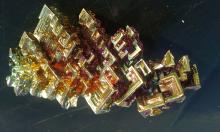Chinese heavy launch vehicle Long March 5B goes out of control and may fall down on Earth
Long March 5B, China's heavy launch vehicle, which went out of control after launch, may enter the atmosphere and fall down on Earth. The place of the possible fall remains unknown, CNN reports citing Pentagon spokesman Mike Howard.
It is believed that the Chinese rocket will enter Earth's atmosphere on May 8. It will be possible to establish the exact location of the fall a few hours before that. This is currently not possible due to the speed of the rocket, Mike Howard said.
"U.S. Space Command is aware of and tracking the location of the Chinese Long March 5B in space, but its exact entry point into the Earth's atmosphere cannot be pinpointed until within hours of its reentry, which is expected around May 8,” Howard said.
Russia's space agency Roscosmos said on May 4 that its Automated Warning System on Hazardous Situations in Outer Space (ASPOS OKP) indicated that the Long March 5B was set for an uncontrolled reentry. The Chinese rocket does not pose any danger to Russia, the agency also said.
On April 29, China launched the main module of the future Chinese space station Tiangong from the Wenchang Cosmodrome in Hainan, LiveScience reports. The Long March 5B launch vehicle delivered the module into orbit. After the delivery, the rocket was supposed to make a controlled entry into the Earth's atmosphere, but this did not happen. Soon, ground-based radars found it tumbling around the Earth at a speed of more than 25,490 km/h. The space object was named 2021-035B. It is 30 meters long, 5 meters wide, and weighs about 20 tons.
Long March 5B's previous flight ended in May 2020 with most of the launch vehicle burning down, even though some of the debris made it to Earth. Pieces of metal landed in Côte d'Ivoire, having damaged several buildings and luckily no one was hurt.
Specialists presume that the Chinese rocket will return on Saturday, May 8, but the exact landing site has not been established yet. The rocket is now moving at the latitude of New York, Madrid, southern Chile, and New Zealand's Wellington. Most of it will hopefully burn down in the atmosphere before impacting the Earth, but surviving debris could land anywhere in this range.
Subscribe to Pravda.Ru Telegram channel, Facebook, RSS!




